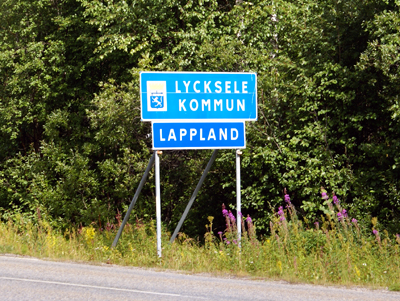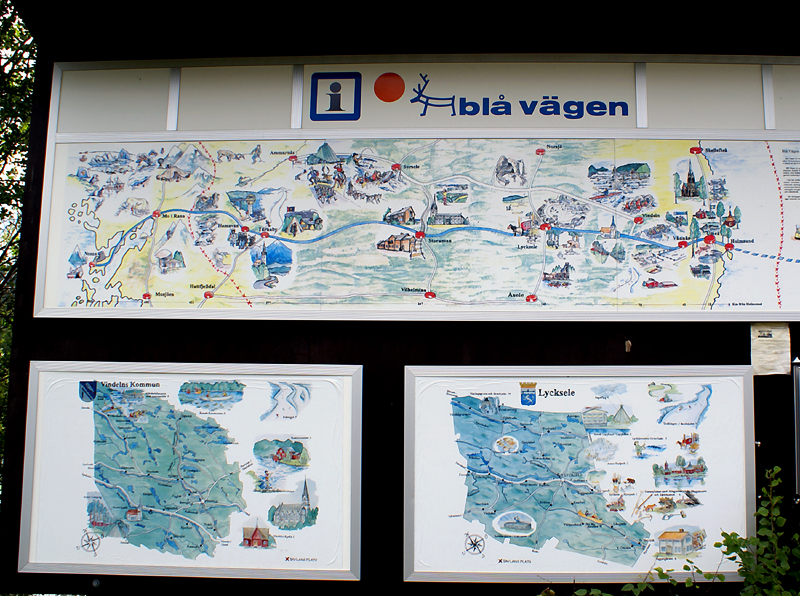Exploring Norrland Posted by Transparent Language on Aug 12, 2008 in Vocabulary
One good thing about being from (or living in) Umeå is that you’re not from anywhere else in Västerbotten. Because imagine the alternatives! You could be from a place like Lycksele, for example.
I’m sure that Lycksele is a perfectly delightful little town, or a large village depending on who’s talking, of about 9 thousand people. Delightful for a short period of time, that is. And considering the numbers of teens and young people from Lycksele who come to Umeå every Saturday night in search of adventure, excitement and really wild things, you can kind of guess they share my opinion. And don’t forget the housewives on shopping trips! Lycksele may brag that three chain stores have opened there in recent years, and they even have a Dollar Store (which is not really a dollar store at all, but a normal Swedish shop) in town, but that still doesn’t change the fact that to most Lycksele-bor Umeå is a shining metropolis filled with swanky shops and fashionable people. No Dollar Store can match that.
Don’t get me wrong, it’s a charming town, but a charming podunk town, and the label of “Lapp Stockholm” is very misleading. But to be honest, I’ve never heard anyone except the Lycksele kommun (municipal district) and tourist office employees use that term. And even then, they whisper it quietly.
But yeah, Lycksele is indeed in Lappland. Now, wait a second, I know this is confusing, in English “Lapland” is spelled with only one “p”, but in Swedish with two. I like the Swedish spelling better.
Now I think you can guess where I went last Saturday. Ha! I got in the car and drove the 12,5 miles (and since we’re talking about Swedish miles here, it means about 125 kms; 1 Swedish mile = 10 kms) to Lycksele. Just because. And besides, I’ve never actually been there before. Umebor don’t normally go there, it works the other way round – Lycksele-bor come here.
What? You want to know what “Umebo” is? It’s a person who lives in Umeå. Lycksele-bo is a person who lives in Lycksele, and so on…
But where were we? Oh yes, driving to Lappland. The drive is actually very pleasant, providing it doesn’t rain or snow, of course. The road to Lycksele, E12 (European Route 12) is known as “Blå Vägen” – the Blue Highway in Sweden. It actually starts in Mo i Rana (now, that’s a funky name for a town, isn’t it?) in Norway, and goes across Sweden, through a ferry connection to Vasa in Finland, all the way to Russia.
But in Vasa, E12 and Blå Vägen divide – E12 goes to Helsinki, and Blå Vägen continues to Petrozavodsk in Russia.
In comparison to the European Route E4, which goes South-North in Sweden, E12 looks like a poor, provincial cousin. There are no security fences protecting you from crazed moose jumping into the middle of the road and the speed limit is 90km/h (about 56 mph), though mostly it’s even lower – too many villages cling to the highway and the people living there (and sometimes their chickens too) occasionally do cross the road. But at least the views are gorgeous. I’ll never forget driving on Blå Vägen one sunny September morning a couple of years ago. The trees were turning gold, the rivers were sparkling, and the air was so clear you could see for miles. And not another car in sight pretty much all the way to Tärnaby.
To be continued…
Words for today:
- län (def. länet, plural: län, def. plural: länen) – en regional förvaltningsområde – a regional administrative district in Sweden, something like a county in the UK, or a state in the US.
For example, Västerbotten is a län. Currently there are 21 län in Sweden.
- kommun (def. kommunen, plural: kommuner, def. plural: kommunerna) – ett territoriellt avgränsat område och en administrativ enhet för lokal självstyrelse – a territorially defined area and an administrative self-governing local unit. In other words, a municipal district.
So, län are comprised of kommuner, and for example Lycksele is a kommun in the län of Västerbotten.

Build vocabulary, practice pronunciation, and more with Transparent Language Online. Available anytime, anywhere, on any device.






Comments:
Darlene Gates:
Kära Anna,
I really do enjoy your blog. Here is a question (a bit off topic) for you that I can’t find the answer to in my Lära Svenska books. How do you say (speak), for example, 19th century, 21 century? Kanske tala du nittiohundra, tjugohundra???
Darlene
Peter Miller:
Hej Anna
Is it OK to use some of your information and pictures in Calgary’s Scandinavian Club Newsletter if we credit the Swedish Blog?
Our readers and swedish language students would find your blog very interesting.
mvh
Peter
Calgary, Alberta Canada
ceci:
hehehehe i fit on “housewives trip” but i think, as regards what i know about lycksele, that it is a good description! you know, we have two little children :octavio of 5 and maxima of 2…we really need the delightful place!!! and i think it would take time to go to umea to have fun!!! at least on our first time!!! i have a nice friend from umea, kindly person! thank you anna again, for your words here…kisses, ceci
Anna:
Hi ceci,
I’m not done with Lycksele YET! There’s more to come! 😉 Be patient.
Hej Peter,
Thank you for your comment. Sure, I think that would be fine! I’d love to see your newsletter, too!
Darlene,
you mean like for example:
in the 20th century = på 1900-talet, or alternatively = i tjugonde århundradet
ceci:
sorry anna…i cant find “podunk ” on the dictionnary…what is the meaning of that word? thank you, ceci…a next Lycksele-bo!
ceci:
hehehe as you can see…( better, as you can read)i am eager for be there!
Lelia:
Hiya Anna,
If the city, town, or village ends in an o or an a ie: Orebro or Skollersta, which endings or suffixes would you would to indicate an inhabitant of that city, town or village?
Great geography lesson.
Any information would be greatly appreciated.
Cheers and Thank you,
Lelia
Anna:
Hi Lelia,
A person from Örebro is “örebroare”, and a person from Sköllersta is “sköllerstabo”, a person from Stockholm is “stockholmare”.
Anna:
Hi ceci,
hmmm a “podunk town” would be a small town in the middle of nowhere! LOL 🙂
We have to get together for fika when you arrive here!
ceci:
ok anna, i am still here heheh doing a deep analysis of the post! heheh of course we ll meet there!!! on march 2009…little time in front of me and my family to reach the point hhehe bye, ceci…ska vi fika??? so, children learned: ska vi leka? i told them: this is an important phrase you must remember! heheh they look at me and repeat the phrase, every day…hehe
ceci:
the last comment:http://www.lycksele.se/upload/25335/Kulturdag%20på%20Gammplatsen.pdf
that would be nice
Darlene Gates:
Hej Anna,
Actually, I mean, how would you say, for example, 2007? Sorry for the confusion…Darlene
Anna:
Hi Darlene,
with the two thousands, it’s easy
“2008” you say as “två-tusen-åtta”, exactly like you’d say it in English “two thousand eight”.
Darlene Gates:
Hej Anna,
Jaha! Tack så mycket.–Darlene